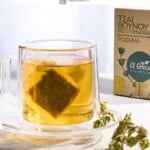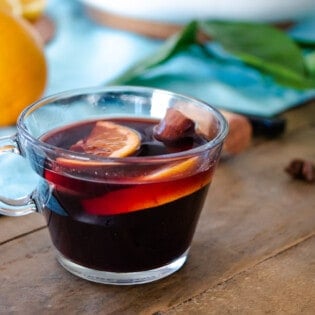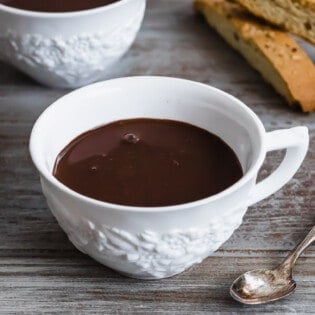Greek Mountain Tea, also known as Shepherd’s Tea and Tsai tou Vounou, is an ancient herbal tea made from the sideritis plant. Learn everything you need to know about this cozy, comforting tea with this essential guide, including Greek mountain tea’s benefits, how to brew it, what it tastes like, and more.
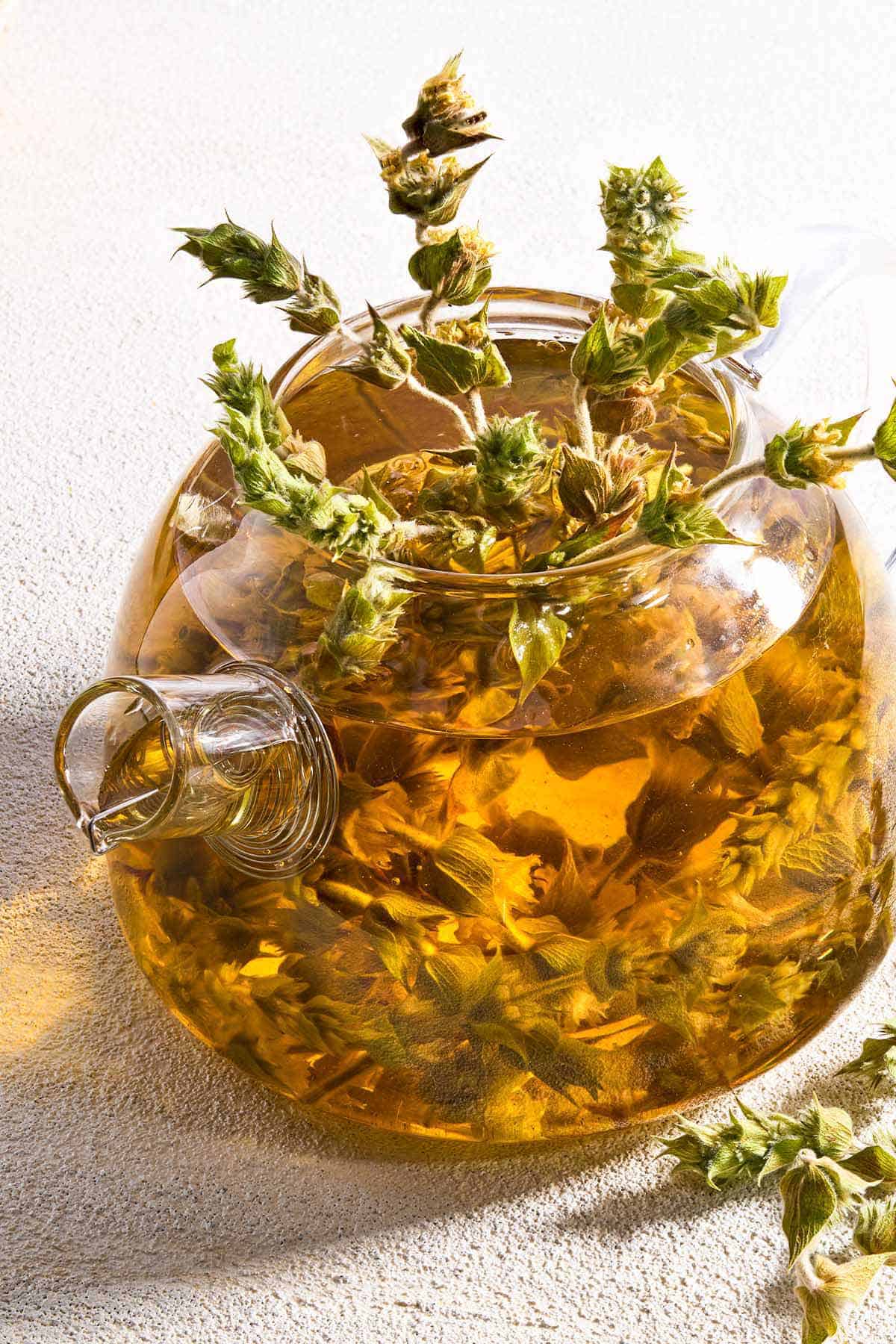
Table of Contents
What is Greek Mountain Tea?
Greek mountain tea—whether it’s authentic tea on the vine or a bagged variety—is a delicate, aromatic, slightly savory tea made by steeping the leaves, flowers, and stems of the sideritis plant in boiling water. You can drink it hot, over ice (untraditional, but refreshing), unsweetened or with a spoonful of Greek honey.
This ancient tea has a long and fascinating history in Greek culture. Sideritis comes from the Greek word “sideros” meaning “iron.” It was once believed to heal wounds caused by iron weapons!
While I have not tested its efficacy on any iron wounds, I can say I have enjoyed the unique comfort and antioxidant-boost Greek Mountain Tea brings. This has proved particularly true both at the end of a difficult day and when I’m fighting a cold.
A warming freshly brewed cup has become the winter version of my childhood favorite Egyptian hibiscus tea, Karkade. It’s a feel-good antidote to a sugary soda craving, and just a lovely way to treat myself to a little TLC.
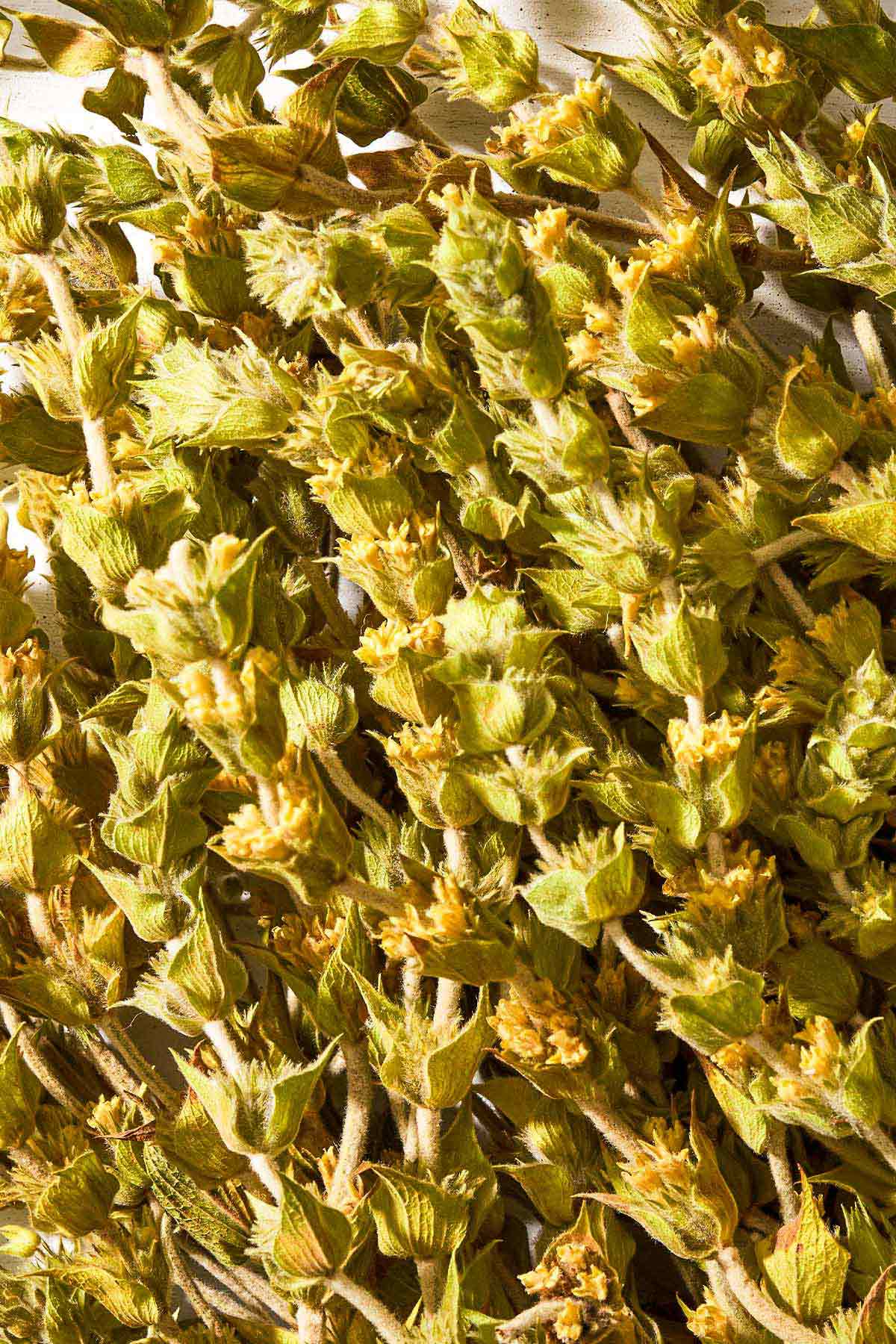
Greek Mountain Tea Benefits
Ancient Greeks have used the sideritis plant as a natural healer for centuries. It was historically believed to clear colds and respiratory infections as well as heal wounds. If this sounds too woo-woo for you, though, there’s some real data backing up Greek Mountain Tea’s benefits.
The Sideritis plant is rich in polyphenols—yes, the same beneficial compounds found in extra virgin olive oil. Polyphenols are natural plant compounds known for their powerful antioxidant and anti-inflammatory properties.
In fact, The Acute and Chronic Cognitive and Cerebral Blood Flow Effects of a Sideritis scardica (Greek Mountain Tea), a study published in the National Library of Medicine, tested 155 people aged 50-70. They gave them varying doses of Greek Mountain tea, a placebo, or Ginkgo biloba (another herbal supplement).
They then measured memory, mood, blood pressure, and brain blood flow after one day and again after one month. They found:
- Reduced anxiety: A higher dose of Greek Mountain tea (950 mg) reduced anxiety.
- Increased memory: Greek Mountain tea helped participants avoid mistakes on a memory task compared to the placebo and Ginkgo.
- Improved focus: Both doses of tea showed signs of improving focus speed, especially when compared to Ginkgo.
- Improved oxygen: Greek mountain tea increased oxygen levels in the brain on the first day, with the 475 mg dose showing the most pronounced effects.
- Blood pressure: No significant change in blood pressure.
Overall, the study shows Greek mountain tea adds some immediate benefits in cognitive tasks and brain oxygenation, with longer-term improvements in mood. While many tea companies will swear by the heal-all magic of Greek Mountain Tea, I can personally say that it is a comforting herbal beverage that may just bring you a nice pick-me-up when you need it!
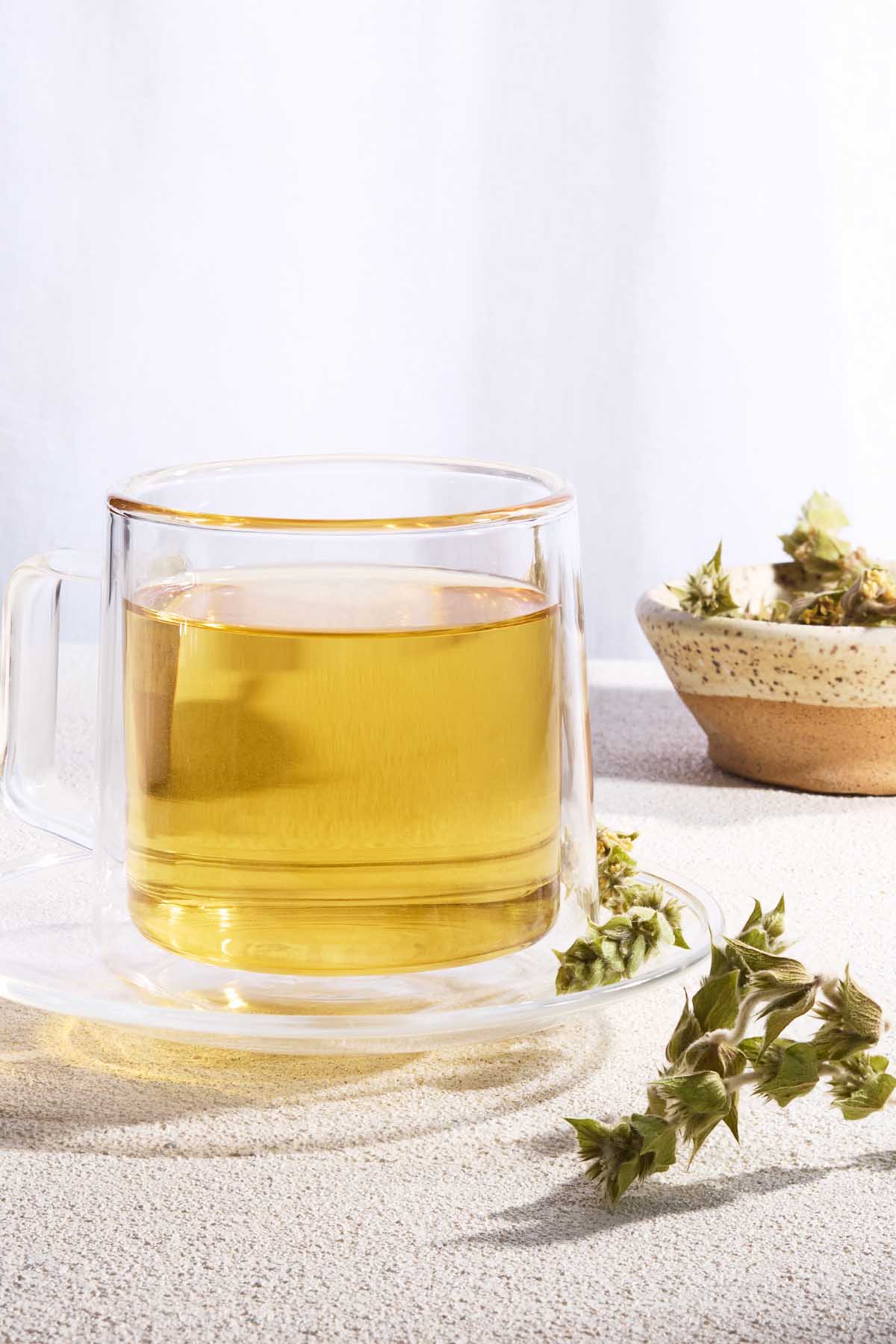
What Does Greek Mountain Tea Taste Like?
Authentic Greek mountain tea on the vine is delicate and rather mild in flavor. I find it similar to dried oregano but slightly sweeter with notes of lemon—somewhere between oregano and chamomile. It’s also quite similar in flavor to linden tea, another herbal tea popular throughout the Mediterranean region.
If you’re brewing Greek mountain tea bags, they’re often mixed with other ingredients like basil, bay leaf, and mint. Some brands are stronger than others, but most lean more savory and herbal rather than sweet and citrusy.
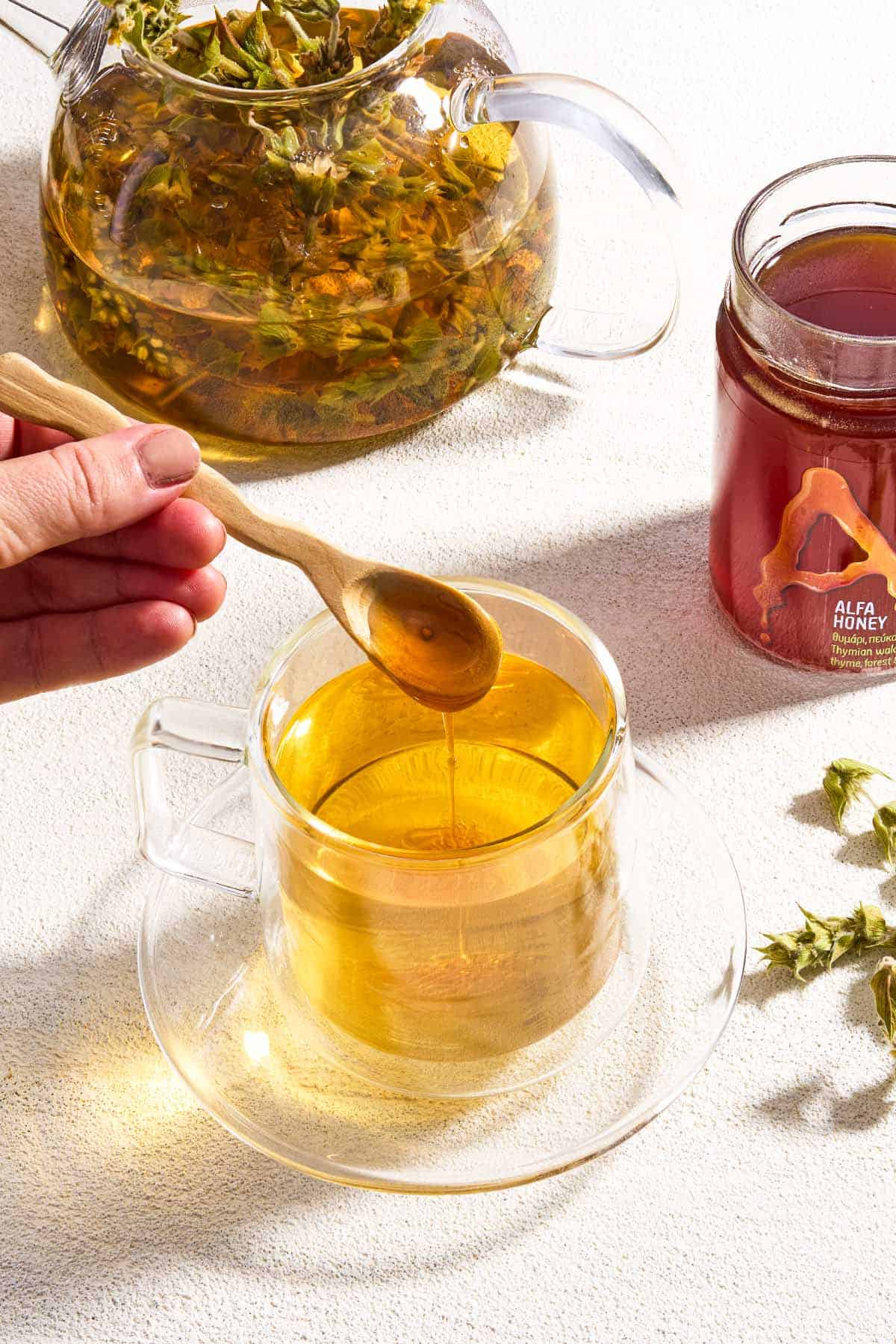
How to Brew Greek Mountain Tea
If you’re brewing Greek Mountain Tea bags, simply pour just-boiling water over one and steep for 5 minutes or so (or follow the package instructions). To brew true Greek mountain tea from the vine:
- Get ready. Bring about 3 cups of water to a boil in a kettle or small pot (like this one). Place 9 grams tea–flowers, sprigs and all–in your pot or mug, discarding just the bottom stems where they’re very thick. (This is about 6 large sprigs. I typically break the branches in half or quarters to fit.)
- Brew. Pour the boiling water over the tea. Cover and let steep for 10 minutes (or to taste), then strain or simply use a spoon to scoop out the sprigs.
- Serve. Finish with a small spoonful of honey, if you’d like.
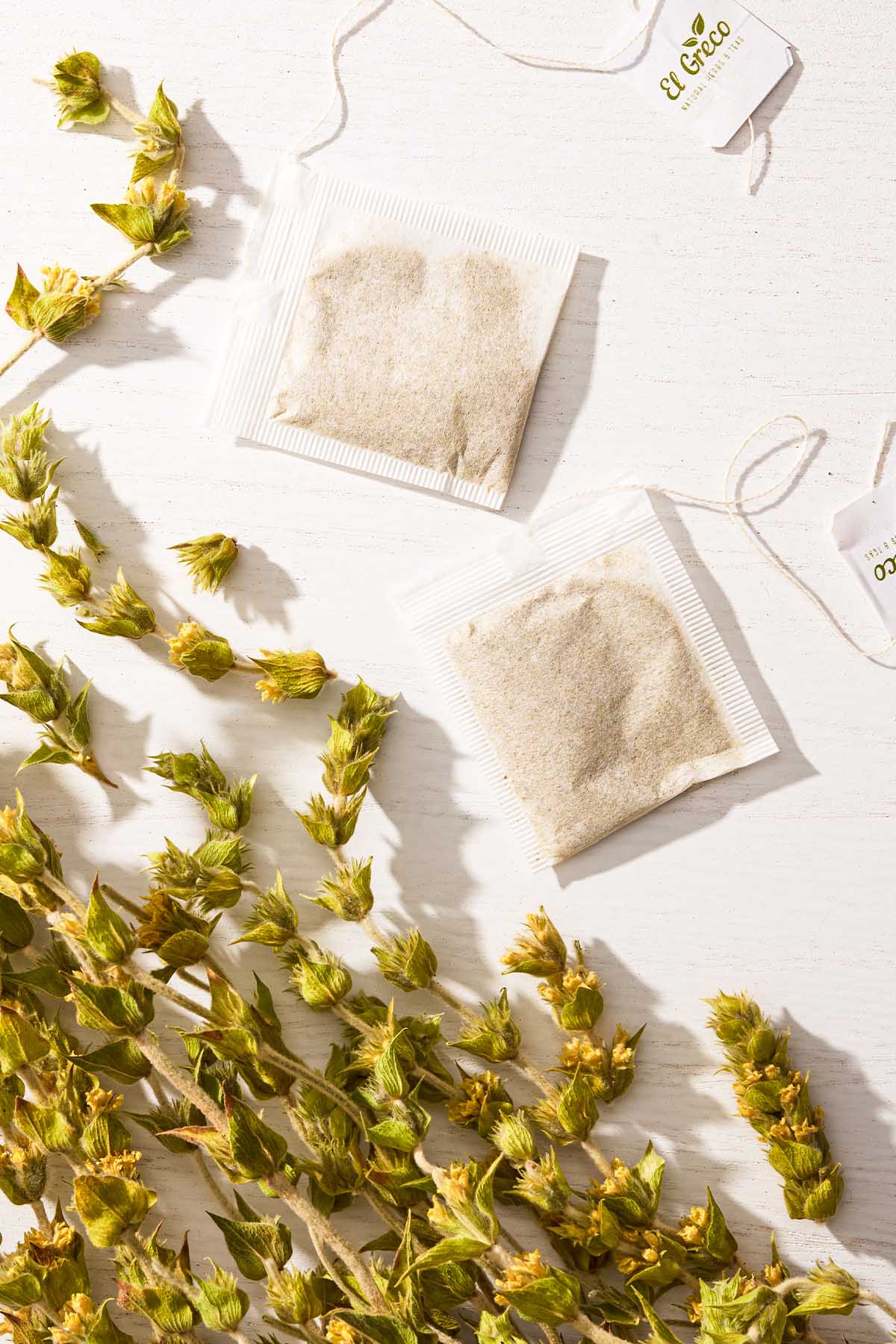
How to Store Tea
Greek mountain tea is light and delicate, so it’s especially important to store it properly so it stays fresh. Here are the key things to keep in mind when storing tea:
- Protect the tea from air: Air can lead to oxidation and diminish the flavor. Store in an airtight container, like a metal tin or tight-fitting jar. The on-the-vine tea we sourced from Greece is quite long—basically the length of my arm! Once I open the package I like to use kitchen scissors to clip the sprigs into an airtight container.
- Keep it cool and dry: Store in a cool, dry environment like your pantry. Don’t store it near the stove, under direct sunlight, or in your refrigerator.
- Avoid strong odors: Tea absorbs odors easily. Keep it away from strong-smelling foods, spices, or cleaning products to avoid flavor contamination.
- How long does tea last? Tea doesn’t spoil like food, but just like any spice its flavor dulls over time. Try to use on the vine and loose-leaf tea within 1 year, and bagged tea within 2 years.
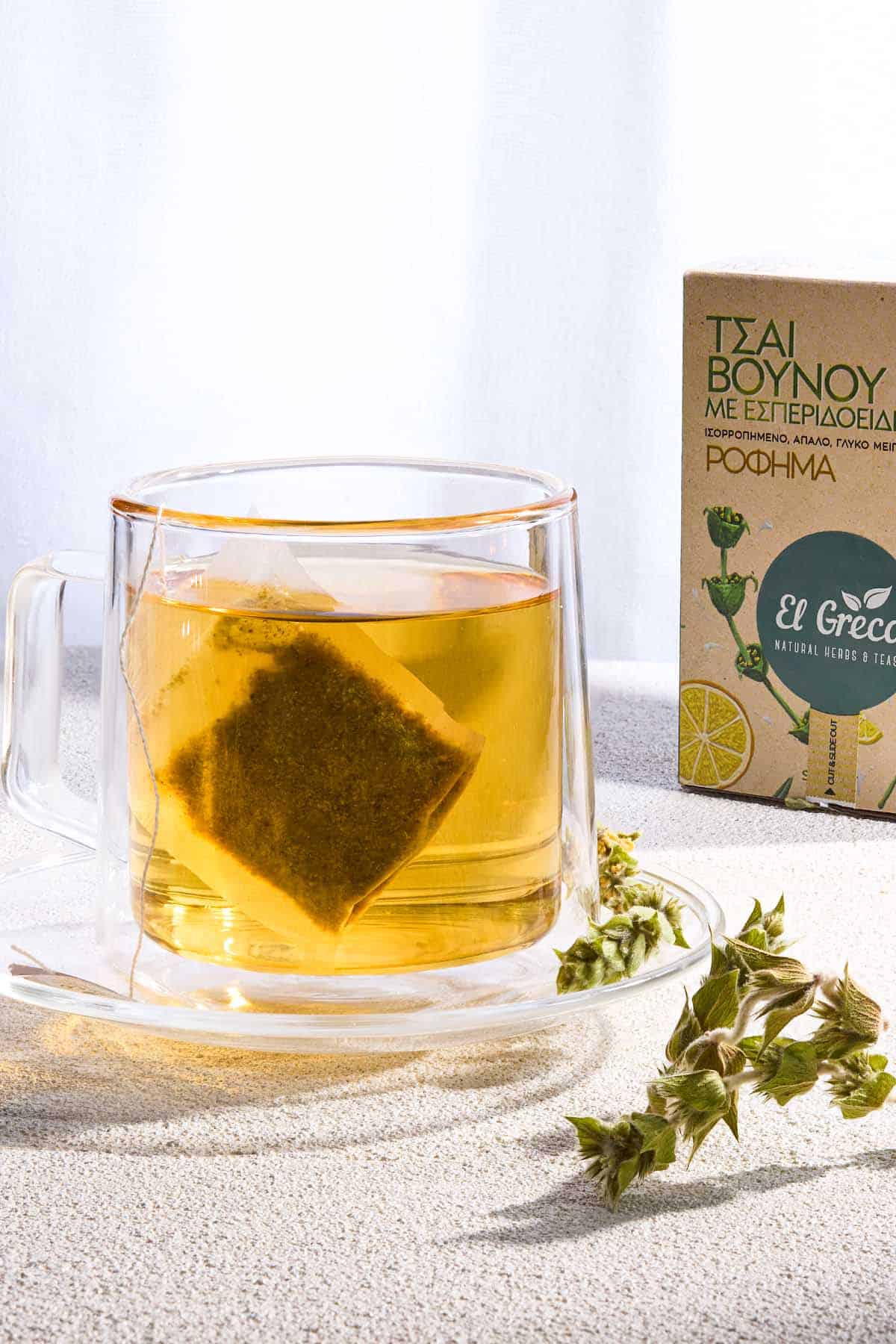
How to Make Iced Greek Mountain Tea
The trick with iced tea is to brew it a bit stronger so it can hold its own against the ice without going overboard and making it bitter. Here’s how to make a refreshing version of Shepherd’s Tea:
- Get ready. Bring 4 cups of water to a boil in a kettle or small pot. Place 15 grams of tea–flowers, sprigs and all–in a pot or mug, discarding just the bottom stems where they’re very thick. (This is about 12 large sprigs, or use 2 tea bags.)
- Brew. Pour the boiling water over the tea. Cover and let steep for 10 minutes (or to taste), then strain or simply use a spoon to scoop out the sprigs.
- Cool. Let cool before adding ice. You can add an ice cube in there to speed this along, or stick it in your fridge or freezer (don’t forget about it, or you’ll have sideritis ice!).
- Serve. Stir in a small spoonful of honey, if you’d like, and enjoy.
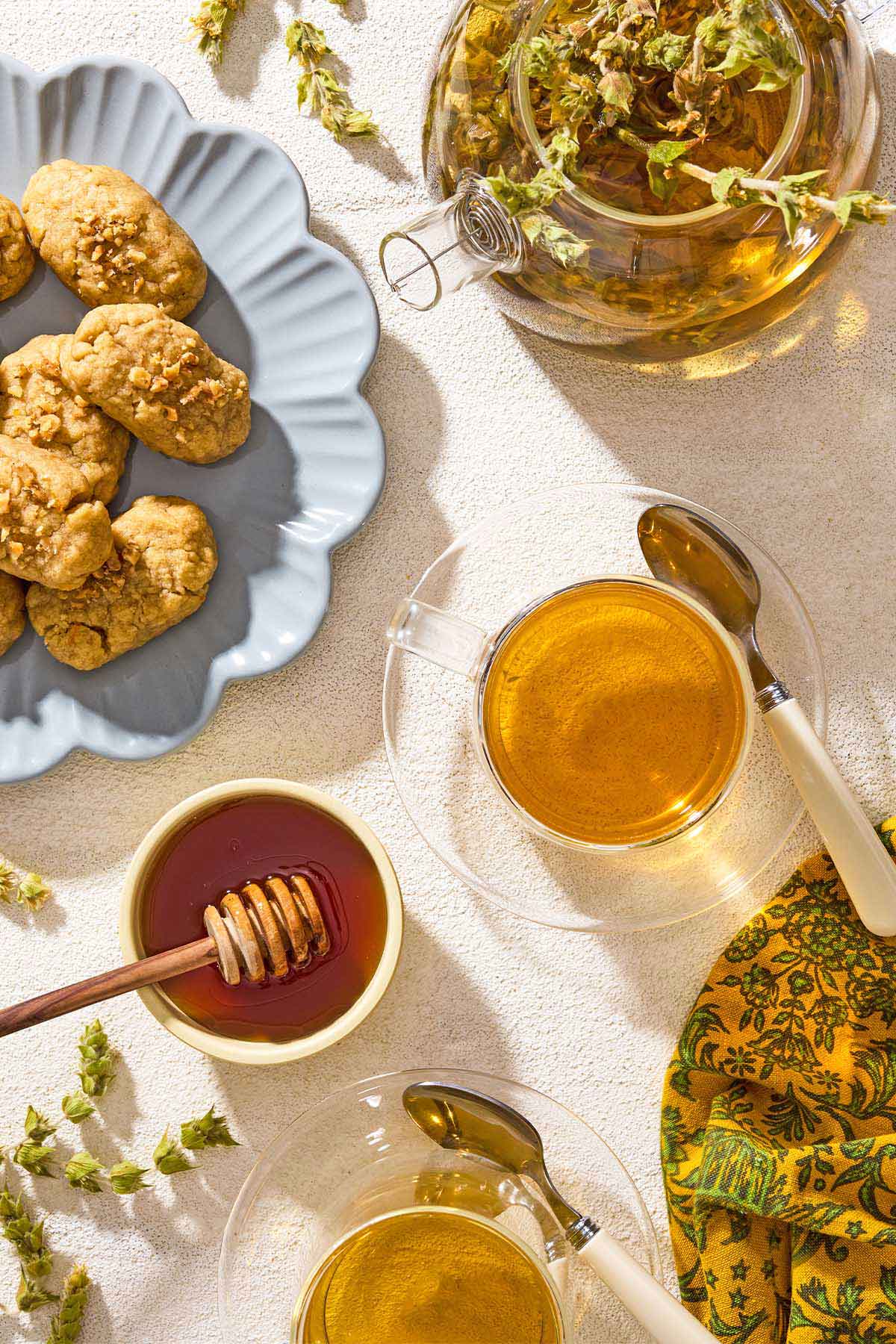
What to Serve with Greek Mountain Tea
If you’re fighting a cold, I recommend a chicken soup like Greek Lemon Chicken Soup or its Persian cousin Soupe Jo. Homemade Chicken Stock—or “bone broth” as marketers would call it–will add a good nutrition boost when your body needs it.
If this is more of a treat-your-self situation, I suggest a small indulgence. Sip on the tea while you enjoy soft orange and cinnamon-scented Melomakarona Greek Cookies. Or if you have time for a little project in the kitchen, there’s nothing as comforting as Homemade Baklava and a hot cup of tea.
Warm Your Bones with These Cozy Sips!
Browse all Mediterranean recipes.
Visit Our Shop.
Greek Mountain Tea
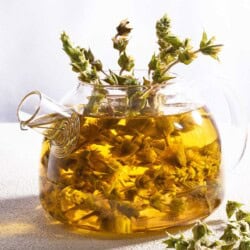
Instructions
- Get ready. Bring the water to a boil in a kettle or small pot. Place the tea–flowers, sprigs and all–in your pot or mug, discarding just the bottom stems where they’re very thick. (I typically break the branches in half or quarters to fit.)
- Brew. Pour the boiling water over the tea. Cover and let steep for 10 minutes (or to taste), then strain or simply use a spoon to scoop out the sprigs.
- Serve. Finish with a small spoonful of honey, if you’d like.
Notes
- Shop this recipe: Visit our shop to browse quality Mediterranean ingredients including the Greek Mountain Tea used in this recipe.
- For 1 cup of tea: Use 2-3 grams tea (about 2 large sprigs, or 3 tablespoons flowers) for every 1 cup of water.
- For iced tea: Use 15 grams of tea and 4 cups of boiling water. Let steep for 10 minutes (or to taste), then strain and allow to cool before adding ice.
Nutrition
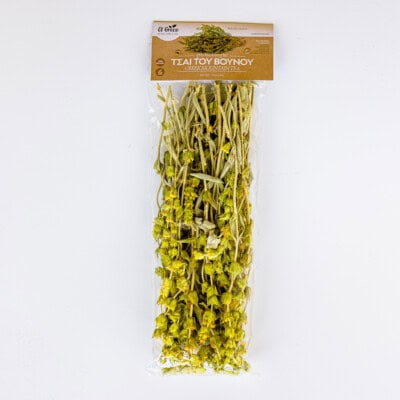
Try Our Authentic Greek Mountain Tea!
100% natural tea made from the ancient Sideritis herb and dried whole for optimal potency.


